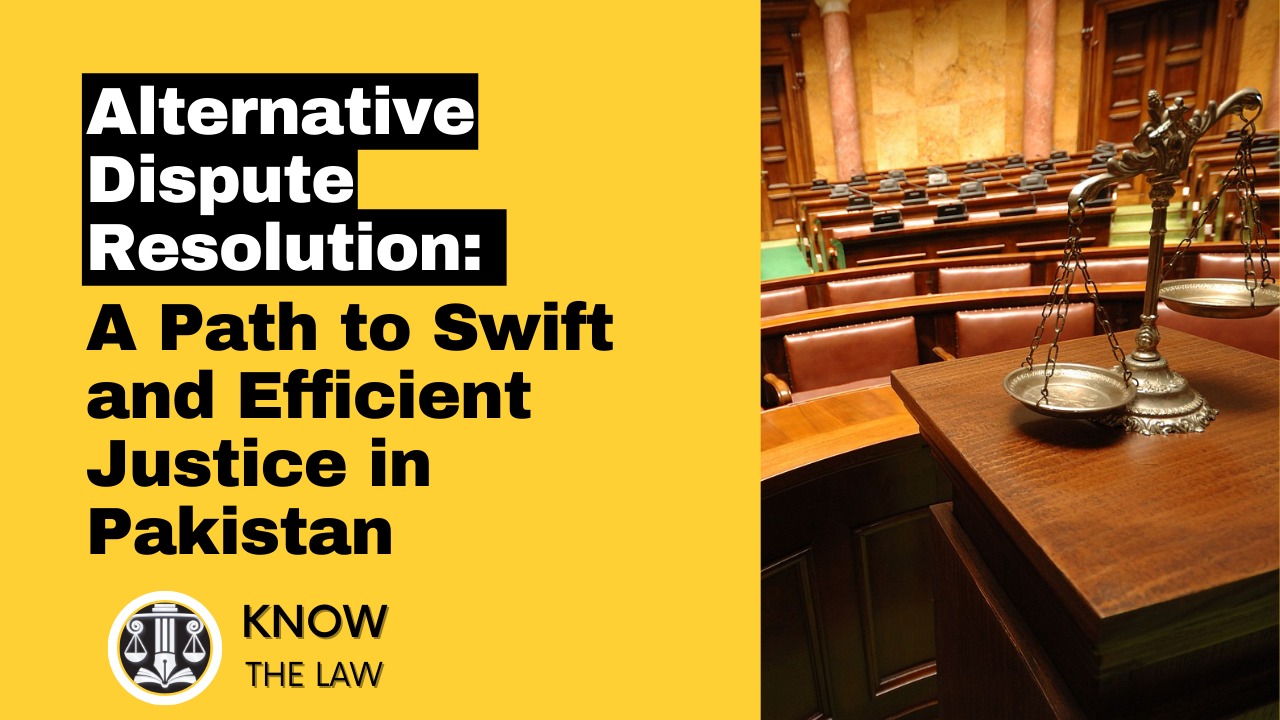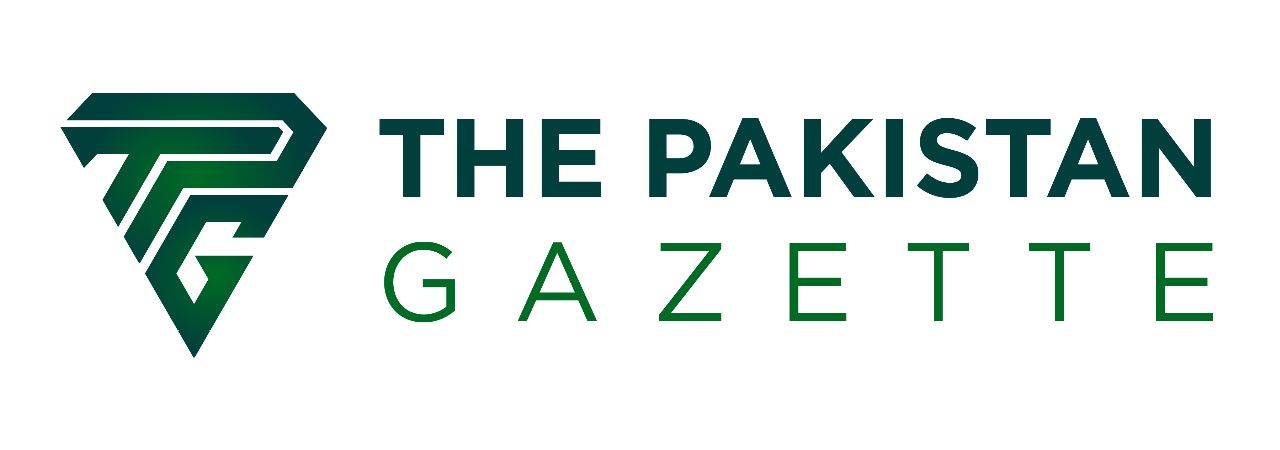
Alternative Dispute Resolution: A Path to Swift and Efficient Justice in Pakistan
In today’s fast-paced world, the traditional court system often struggles to provide timely and cost-effective resolutions to legal disputes. As a result, alternative dispute resolution (ADR) mechanisms have gained popularity as effective alternatives to litigation. This article explores the concept of ADR, its relevance in Pakistan’s legal landscape, and the laws that govern its practice. Additionally, we will examine various examples of ADR methods being successfully utilized in Pakistan.
Understanding Alternative Dispute Resolution (ADR): ADR encompasses a range of methods designed to resolve disputes outside of formal court proceedings. The primary goals of ADR are to promote efficiency, reduce costs, and maintain control over the outcome for the parties involved. ADR methods commonly utilized include negotiation, mediation, arbitration, conciliation, and hybrid approaches.

ADR Laws in Pakistan:
In Pakistan, the legal framework for ADR is primarily governed by the Arbitration Act 1940 and the Alternative Dispute Resolution Act 2017. The Arbitration Act provides a comprehensive framework for arbitration, while the ADR Act focuses on promoting the use of ADR methods across various sectors, including commercial, civil, and family disputes.
Arbitration:
Arbitration is a widely recognized form of ADR in Pakistan. The process involves the appointment of an impartial third party, an arbitrator, who considers evidence and arguments presented by the parties to reach a binding decision. The Arbitration Act provides guidelines for initiating arbitration proceedings, the appointment of arbitrators, and the enforcement of arbitral awards.
Mediation and Conciliation:
Mediation and conciliation are non-binding ADR methods that emphasize facilitation and negotiation to help parties reach a mutually acceptable resolution. Trained mediators or conciliators assist the parties in identifying common ground and exploring potential solutions. While mediation and conciliation are not specifically regulated by legislation in Pakistan, they are increasingly used in various contexts, including family disputes and commercial matters.
Court-Annexed ADR:
Recognizing the benefits of ADR, Pakistani courts have implemented court-annexed ADR programs. These programs encourage parties to explore settlement through mediation or other ADR methods before resorting to traditional litigation. Court-annexed ADR can expedite case resolution, reduce court backlogs, and promote greater satisfaction among litigants.
Examples of ADR in Pakistan:
The Punjab Healthcare Commission (PHC):
The PHC has established a robust mediation and conciliation centre to resolve healthcare-related disputes. Through mediation, patients and healthcare professionals can address grievances and find mutually agreeable solutions, avoiding protracted legal battles and preserving professional relationships.
The Banking Mohtasib Pakistan (BMP):
The BMP serves as an independent body for resolving banking-related complaints. It employs conciliation techniques to settle disputes between banks and their customers. The BMP’s approach has proven effective in swiftly resolving disputes and maintaining public confidence in the banking sector.
Family Disputes:
In family matters, such as divorce and child custody cases, mediation and conciliation have gained traction as effective ADR methods. Family courts in Pakistan actively encourage parties to explore ADR processes to reach amicable settlements that prioritize the best interests of children and promote harmonious coexistence.
Benefits and Challenges of ADR in Pakistan:
The adoption of ADR in Pakistan presents several advantages. ADR can significantly reduce the burden on the formal court system, save time and costs for the parties involved, and foster more cooperative and durable solutions. However, challenges remain, including limited awareness and understanding of ADR methods, the need for qualified ADR practitioners, and resistance to change within the legal profession.
Conclusion:
Alternative dispute resolution offers a promising pathway to swift and efficient justice in Pakistan. By embracing ADR methods and developing an effective legal framework, Pakistan can enhance access to justice, promote efficiency, and alleviate the burden on its courts. The Arbitration Act and the Alternative Dispute Resolution Act have laid the groundwork for ADR practices in the country, while court-annexed ADR programs have shown promising results.
Furthermore, there are notable success stories where ADR methods have been embraced in Pakistan. The Punjab Healthcare Commission’s mediation and conciliation centre have provided a platform for resolving healthcare disputes, allowing patients and healthcare professionals to find common ground and maintain trust. Banking Mohtasib Pakistan has successfully employed conciliation techniques to address banking complaints, demonstrating that ADR can effectively resolve disputes in the financial sector.
In family matters, such as divorce and child custody cases, mediation and conciliation have emerged as valuable alternatives to litigation. Family courts in Pakistan actively encourage parties to engage in ADR processes, recognizing the importance of preserving family relationships and prioritizing the well-being of children.
The benefits of ADR in Pakistan are significant. First and foremost, ADR methods offer a more streamlined and expedient process for dispute resolution. Unlike the traditional court system, which is often burdened by lengthy delays and backlogs, ADR allows parties to reach a resolution in a more timely manner. This not only saves valuable time and resources but also reduces the emotional stress and uncertainty associated with prolonged litigation.
ADR also provides a greater degree of control and flexibility for the parties involved. Rather than having a judgment imposed upon them by a judge, the parties have the opportunity to actively participate in the resolution process and shape the outcome. This empowerment fosters a sense of ownership and cooperation, facilitating the likelihood of reaching mutually satisfactory agreements.
Moreover, ADR methods are generally more cost-effective than traditional litigation. The expenses associated with court proceedings, such as legal fees and court fees, can be substantially reduced or eliminated through ADR. This makes justice more accessible to a broader segment of the population, especially those who may not have the financial means to engage in protracted legal battles.
Despite these advantages, challenges remain in fully embracing ADR in Pakistan. One of the primary obstacles is the limited awareness and understanding of ADR methods among the general public. Many individuals may not be familiar with the availability and benefits of ADR, leading them to default to traditional litigation even when ADR could offer a more efficient and satisfactory resolution.
Another challenge lies in the need for qualified ADR practitioners. ADR requires skilled and neutral facilitators who can guide the parties through the process and assist in reaching a resolution. Training and capacity-building programs for mediators, arbitrators, and conciliators are essential to ensure the quality and effectiveness of ADR services.
Resistance to change within the legal profession is another hurdle to the widespread adoption of ADR. Some lawyers and judges may be hesitant to embrace ADR, fearing a potential loss of business or the perceived erosion of the traditional court system. Educating and engaging legal professionals in the benefits and merits of ADR can help overcome this resistance and foster a culture of ADR acceptance.
In conclusion, alternative dispute resolution holds immense potential for Pakistan’s legal system. By utilizing mediation, conciliation, and arbitration, among other ADR methods, Pakistan can alleviate the burden on its courts, expedite case resolution, and provide more accessible and efficient justice to its citizens. The legal framework is in place, and success stories in various sectors highlight the positive impact of ADR.
However, to fully realize the benefits of ADR, awareness and understanding of ADR methods need to be increased among the public. Efforts must be made to train and develop a pool of qualified ADR practitioners, and the legal profession should be encouraged to embrace ADR as a complementary and valuable approach to dispute resolution.
With the right support, investment, and collaboration, ADR can become a cornerstone of Pakistan’s legal system, fostering a culture of efficient and accessible justice. Public awareness campaigns, educational initiatives, and training programs can play a crucial role in promoting the understanding and acceptance of ADR methods.
The government, legal institutions, and professional organizations should work together to develop guidelines and standards for ADR practitioners, ensuring their competency and adherence to ethical practices. By establishing accreditation systems and promoting continuous professional development, the quality and effectiveness of ADR services can be upheld.
Moreover, courts can play a pivotal role in encouraging and promoting ADR. By integrating ADR options into case management processes, judges can actively direct parties towards ADR methods, emphasizing the benefits of quicker resolutions and reducing the burden on the court system. Clear guidelines and protocols for referring cases to ADR should be established, maintaining a balance between voluntary participation and the court’s authority.
International best practices and experiences from other jurisdictions can also provide valuable insights for Pakistan’s ADR development. Studying successful ADR models in countries like Singapore, the United States, and India can help identify strategies and approaches that can be adapted to the local context.
In conclusion, alternative dispute resolution has the potential to revolutionize Pakistan’s legal landscape, offering a pathway to swift, cost-effective, and amicable resolution of disputes. By leveraging mediation, conciliation, arbitration, and other ADR methods, Pakistan can alleviate the burden on its courts, reduce the backlog, and promote greater access to justice.
It is essential for the government, legal institutions, legal professionals, and civil society to collaborate in promoting ADR awareness, training qualified practitioners, and integrating ADR into the fabric of the justice system. Through these collective efforts, Pakistan can create an environment where ADR is widely accepted, embraced, and trusted as a viable means of resolving disputes, ultimately serving the best interests of its citizens and strengthening the rule of law.
https://thepakistangazette.com/2023/05/07/protecting-innovation-a-guide-to-intellectual-property-laws-in-pakistan/
https://thepakistangazette.com/2023/03/16/what-is-section-144-in-pakistan/
https://thepakistangazette.com/2023/03/15/fundamental-rights-of-citizens-in-pakistan/
Ihsan Ullah has done LLB (Law and Shariah) from Islamia College University Peshawar. He is a practising lawyer in Peshawar. He writes content related to law at The Pakistan Gazette and on his Instagram Page Know The Law.

